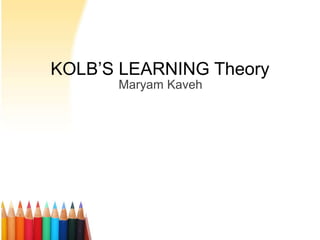Kolb learning
•Download as PPTX, PDF•
24 likes•18,306 views
Kolb learning
Report
Share
Report
Share

Recommended
Recommended
More Related Content
What's hot
What's hot (20)
Similar to Kolb learning
Honey and Mumford learning stylesDo you know your preferred learning style?

Do you know your preferred learning style?Temitope Adelekan MBA, ITIL Expert, Prince2, COBIT 5,PMIIM
Similar to Kolb learning (20)
Experiential learning a Session by Dr. Nicholas Correa

Experiential learning a Session by Dr. Nicholas Correa
Strategies to develop creativity and critical thinking

Strategies to develop creativity and critical thinking
Recently uploaded
God is a creative God Gen 1:1. All that He created was “good”, could also be translated “beautiful”. God created man in His own image Gen 1:27. Maths helps us discover the beauty that God has created in His world and, in turn, create beautiful designs to serve and enrich the lives of others.
Explore beautiful and ugly buildings. Mathematics helps us create beautiful d...

Explore beautiful and ugly buildings. Mathematics helps us create beautiful d...christianmathematics
Recently uploaded (20)
ICT Role in 21st Century Education & its Challenges.pptx

ICT Role in 21st Century Education & its Challenges.pptx
Explore beautiful and ugly buildings. Mathematics helps us create beautiful d...

Explore beautiful and ugly buildings. Mathematics helps us create beautiful d...
Unit-V; Pricing (Pharma Marketing Management).pptx

Unit-V; Pricing (Pharma Marketing Management).pptx
Beyond the EU: DORA and NIS 2 Directive's Global Impact

Beyond the EU: DORA and NIS 2 Directive's Global Impact
Basic Civil Engineering first year Notes- Chapter 4 Building.pptx

Basic Civil Engineering first year Notes- Chapter 4 Building.pptx
This PowerPoint helps students to consider the concept of infinity.

This PowerPoint helps students to consider the concept of infinity.
Measures of Central Tendency: Mean, Median and Mode

Measures of Central Tendency: Mean, Median and Mode
Kolb learning
- 1. KOLB’S LEARNING Theory Maryam Kaveh
- 2. Who is Kolb ? David A. Kolb (born 1939) is an American educational theorist whose interests and publications focus on experiential learning, the individual and social change, career development, and executive and professional education. He is the founder and chairman of Experience Based Learning Systems, Inc. (EBLS), and a Professor of Organizational Behavior in the Weatherhead School of Management, Case Western Reserve University, Cleveland, Ohio.
- 4. Learning Cycle Kolb's model therefore works on two levels - a four-stage cycle: • Concrete Experience - (CE, feelings, kinesthetic responses) • Reflective Observation - (RO, watching, analyzing) • Abstract Conceptualization - (AC, critical thinking) • Active Experimentation - (AE, doing)
- 5. Learning Cycle • Concrete Experiencers like to learn by experiencing. They like games and role playing. They learn from and with other people and value discussion and feedback. • Reflective Observers learn by reflecting. They like to look at things carefully from a variety of perspectives. They enjoy lectures and objective tests where knowledge is demonstrated. • Abstract Conceptualizers are logical and systematic. They appreciate deductive thinking based on their careful understanding. They like theory and appreciate alone study time. They create ideas that are clear and well- structured. • Active Experimenters learn by doing. They like to practice and try new things. They are not afraid of taking risks and are known for getting things done. They appreciate small group discussions and individual self-paced projects or activities.
- 6. Learning Styles Four-type definition of learning styles, (each representing the combination of two preferred styles, rather like a two-by-two matrix of the four-stage cycle styles, as illustrated below), for which Kolb used the terms: • Diverging (CE/RO) • Assimilating (AC/RO) • Converging (AC/AE) • Accommodating (CE/AE)
- 8. diverging • Between “concrete” and “reflective” = diverging • They tend to : recognize problems brainstorm options gather information strong in the arts work in groups receive personal feedback Generate lots of ideas • And they are sensitive. interested in people open-minded be imaginative be understanding
- 9. assimilating • Between “reflective observation” and “abstract conceptualization” = assimilating • They tend to: plan create models define problems develop theories be patient • And enjoy of: Take a concise, logical approach. good clear explanations rather than practical opportunity. wide-ranging information and organizing it a clear logical format. ideas and abstract concepts. information and science careers. reading, lectures, exploring analytical models, and having time to think things.
- 10. converging • Between “abstract conceptualization” and “active experimentation” = converging • They tend to: solve problems make decisions reason deductively be logical find solutions to practical issues. technical tasks Find practical uses for ideas and theories. experiment with new ideas. work with practical applications Use deductive reasoning to solve problems • and are less concerned with people.
- 11. accommodating • Between “active experimentation” and “concrete experience” = accommodating • They tend to : get things done lead take risks initiate be adaptable and practical 'hands-on' learning. intuition rather than logic. take a practical, experiential approach. new challenges and experiences. learn which involves action and initiative. work in teams to complete tasks. Uses targets and works in the field. Good at actively engaging with the world and actually. doing things instead of reading about and studying them •
- 12. Doing (Active Experimentation - AE) Watching (Reflective Observation - RO) Feeling (Concrete Experience - CE) Accommodating (CE/AE) Diverging (CE/RO) Thinking (Abstract Conceptualization - AC) Converging (AC/AE) Assimilating (AC/RO)
